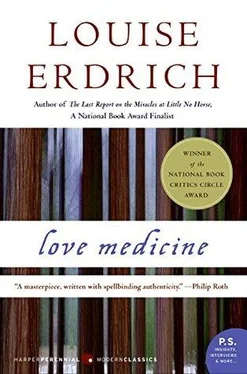Louise Erdrich - Love Medicine
Здесь есть возможность читать онлайн «Louise Erdrich - Love Medicine» весь текст электронной книги совершенно бесплатно (целиком полную версию без сокращений). В некоторых случаях можно слушать аудио, скачать через торрент в формате fb2 и присутствует краткое содержание. Год выпуска: 2005, Издательство: Harper Perennial Modern Classics, Жанр: Современная проза, на английском языке. Описание произведения, (предисловие) а так же отзывы посетителей доступны на портале библиотеки ЛибКат.
- Название:Love Medicine
- Автор:
- Издательство:Harper Perennial Modern Classics
- Жанр:
- Год:2005
- ISBN:нет данных
- Рейтинг книги:3 / 5. Голосов: 1
-
Избранное:Добавить в избранное
- Отзывы:
-
Ваша оценка:
- 60
- 1
- 2
- 3
- 4
- 5
Love Medicine: краткое содержание, описание и аннотация
Предлагаем к чтению аннотацию, описание, краткое содержание или предисловие (зависит от того, что написал сам автор книги «Love Medicine»). Если вы не нашли необходимую информацию о книге — напишите в комментариях, мы постараемся отыскать её.
Love Medicine — читать онлайн бесплатно полную книгу (весь текст) целиком
Ниже представлен текст книги, разбитый по страницам. Система сохранения места последней прочитанной страницы, позволяет с удобством читать онлайн бесплатно книгу «Love Medicine», без необходимости каждый раз заново искать на чём Вы остановились. Поставьте закладку, и сможете в любой момент перейти на страницу, на которой закончили чтение.
Интервал:
Закладка:
Sometimes it put her to sleep in half an hour. Other times she hit on a tune and scribbled, wherever it took her, until dawn.
The sitting room was newly attached to the main convent and insulated heavily, so her music disturbed no one. On warm nights she even opened windows and let the noises drift in, clear in the dry air, from the town below. They were wild noises hoarse wails, reeling fiddle music, rumble of unmufflered motors, and squeals of panicked acceleration.
Then after three or four in the morning a kind of dazed blue silence fell, and there was nothing but her own music and the black crickets in the wall.
Tonight, perhaps because of her dream, which was both familiar and something she did not understand, the music was both faintly menacing and full of wonder. It took her in circles of memories. A shape rose in her mind, a tree that was fully branched like the main candelabrum on the altar of the Blessed Virgin. It had been her favorite tree to climb on as a child, but at night she had feared the rasp of its branches.
She stopped, particularly struck by a chance phrase, and played it over with slight variations until it seemed too lovely to discard.
Then she wrote it down. She worked in silence for a while after, seeing something that might become a pattern, approaching and retreating from the strength of her own design.
An hour or perhaps two hours passed. The air was still. Sister Mary Martin heard nothing but the music, even when she stopped playing to write down the notes. A slim gravel path led around the back of the convent, but perhaps, she thought later, the man had walked through the wet grass, for she did not hear him approaching and only realized his presence at the window when the sill raffled. He’d tried to knock, but had fallen instead against the frame. Mary Martin froze in her chair and laid the clarinet across her lap.
“Who’s there?” she said firmly. There was no answer. She was annoyed, first to have her night invaded and then with herself for not having drawn the blinds, because the sky was black and she could not see even the shadow of the prowler’s shape while she herself was perfectly exposed, as on a stage.
“What do you want?” There was still no answer, and her heart sped, although the windows were screened and secure. She could always rouse the others if she had to. But she was consistently the one called upon to lift heavy boxes and jump start the commuity’s car. Probably it would be up to her to scare off this intruder m herself, even if the others came downstairs.
She reached up and switched the lamp off. The room went utterly dark.
Now she heard his breath rasp, his shudder lightly ring the screen. Her eyes adjusted, and she saw the blunt outline of him, hang-dog, slumped hard against the window.
“What do you want?” she repeated, rising from the chair. She began to lower the clarinet to the carpet, then held it. If he came through the screen slieCOL11d poke him with the playing end. She walked over to the dense shadow of the bookshelf, near the window and against the wall, where she thought it would be impossible for him to see her.
A breeze blew through the screen and she smelled the sour reek of him.
Drunk. Probably half conscious.
But now he roused himself with a sudden ‘erk and spoke.
“I come to take confession. I need to confess it.
She stood against the wall, next to the window, arms folded against her chest.
“I’m not a priest.”
“Bless me Father for I have sinned.
The voice was blurred, stupidly childish.
“I’ll go get a priest for you,” she said.
“It’s been, shit, ten years since my last confession.” He laughed, then he coughed.
The wind blew up, suddenly, a cold gust from the garden, and a different, specifically evil, smell came from his clothes, along with the smell of something un definably worse.
“What do you want?” she said for the third time.
He banged the screen with his elbow. He turned, hugging himself, pounding his arms with his fists, and threw his forehead against the window frame. He was weeping, she recognized at last. This was the soundless violent way that this particular man wept.
“All right,” she said, knowing and not wanting to know. It would be a very bad thing that he had to say. “Tell me.”
And then he tried to tell her, stumbling and stuttering, about the car and the crowbar and how he’d killed June.
A low humming tension collected In the dark around Mary Martin as she sorted through his Tumbled story. He could not stop talking. He went on and on. Finally it became real for her also.
He had ‘just now killed his wife. Her throat went dry. She held the clarinet across her chest with both hands, fingers pressed on the warm valves and ebony. She listened. Clarity. She could not think. The word fell into her mind, but her mind was not clear.
The metal valve caps were silky smooth. She thought she smelled the blood on him. A knot of sickness formed in her stomach and uncurled, rising in her throat, burning. She wanted urgently to get away from him and sleep. She needed to lie down.
“Stop,” she begged. Her throat closed. He fell silent on her word.
But it was too late. She saw the woman clubbed, distinctly heard the bar smash down, saw the vivid blood.
Her fists were tight knobs. Tears had filled the slight cup where her glasses frames touched her cheeks, and they leaked straight down from there along the corners of her mouth. The tears dropped on her hands, She had to say something.
“Are you sure that she’s dead?”
His silence told her that he was. He seemed to have relaxed, breathing easier, as if telling her had removed some of the burden _,dig from him already She heard him fumble through his clothes. A match snicked. There was a brief glare of light, and then tobacco curled faintly through the window and disappeared in the black room.
Something lit furiously in Mary Martin when she heard him take the smoke in with a grateful sigh. Light pinwheeled behind her eyes, red and jagged, giving off a tide of heat that swept her to the window.
For what she did not know.
Now she stood, trembling, inches from him and spoke into the shadow of his face.
“Where is she?”
“Outside in my car.”
“Take me to see her then,” said Mary Martin.
To get to the portico of the back entryway, she had to pass through the dark chapel. A candle burned, soft orange in its jar, before the small wooden sacristy where the host was kept. She walked by without genuflecting or making the sign of the cross, then made herself stop and go back. The calm of the orange glow reproached her. But after she had bent her knee and crossed herself she felt no different. She left her clarinet on one of the chairs and walked out to unlatch the back door.
She stepped into the coot night air. He had gone before her and was already partway down the path walking bowlegged for balance. She stamped out the glowing cigarette stub he flipped in the grass. He stopped twice, giving in to a spasm of rolling shivers against a drainpipe then again where the gate opened out to the front yard. His car was parked in the lot, askew. She saw it right off-a long, low slung green car directly lit by the yard light. He stopped at the edge of the gravel lot, swaying slightly, and put his hand to his mouth.
She had not seen his face yet, and now, as she stood beside him, forced herself to look, to find something, before she went to the car, that would make it impossible to hate him.
But his face was the puckered, dull mask of a drunk, and she turned quickly away. She walked over to the car, leaving him where he stood.
The backseat was lit from one side, she saw, and so she walked up to it, taking deep breaths before she bent and gazed through the window.
Читать дальшеИнтервал:
Закладка:
Похожие книги на «Love Medicine»
Представляем Вашему вниманию похожие книги на «Love Medicine» списком для выбора. Мы отобрали схожую по названию и смыслу литературу в надежде предоставить читателям больше вариантов отыскать новые, интересные, ещё непрочитанные произведения.
Обсуждение, отзывы о книге «Love Medicine» и просто собственные мнения читателей. Оставьте ваши комментарии, напишите, что Вы думаете о произведении, его смысле или главных героях. Укажите что конкретно понравилось, а что нет, и почему Вы так считаете.












